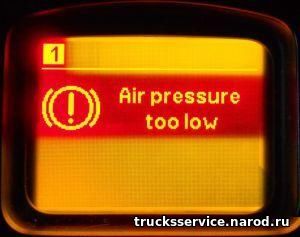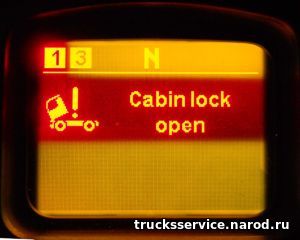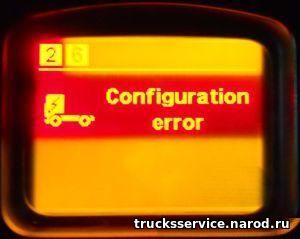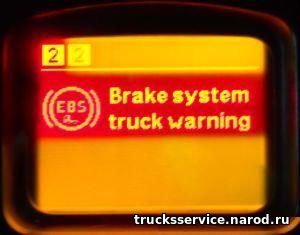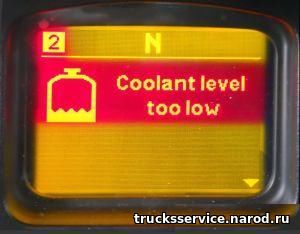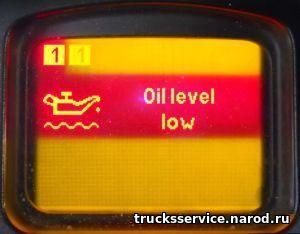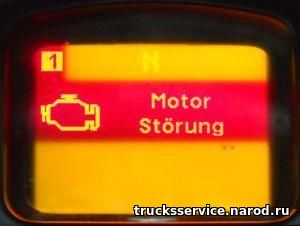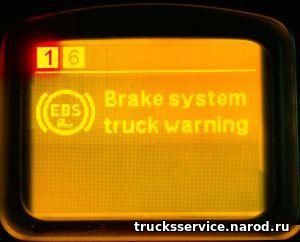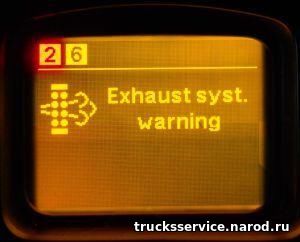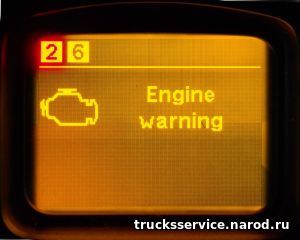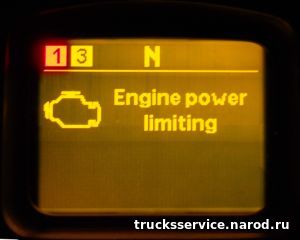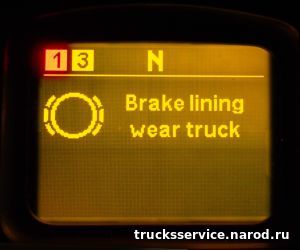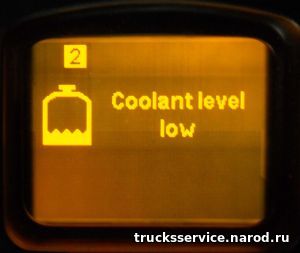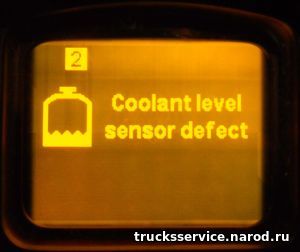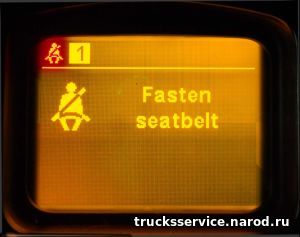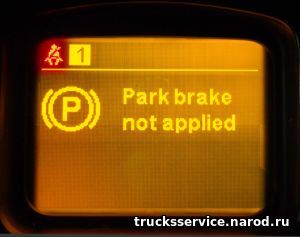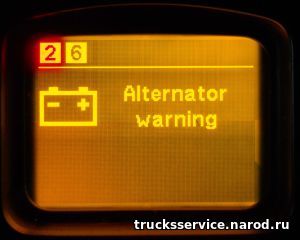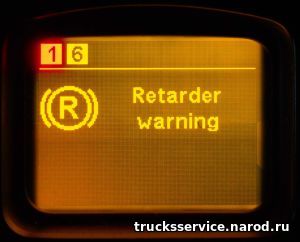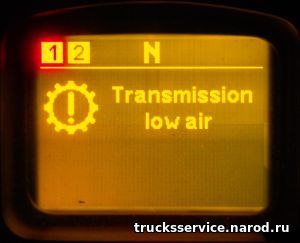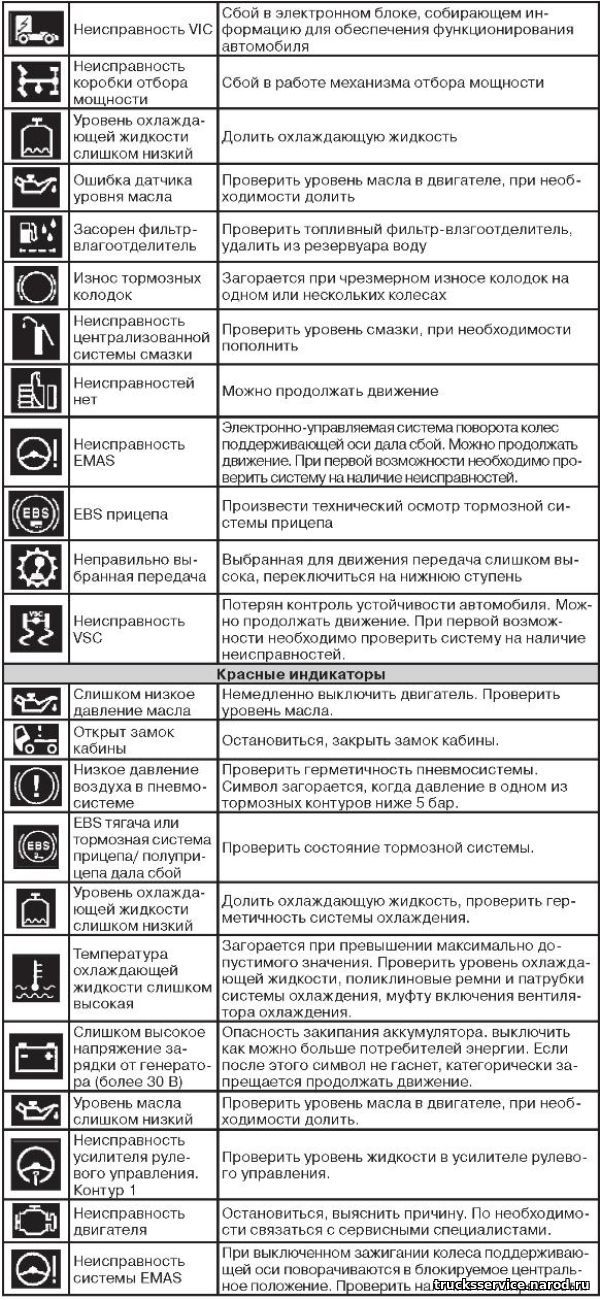
DAF CF, LF & XF Truck Fault Codes DTC pages:
ECAS (air suspension
control), Airtronic (autonomous air heater) DAF DTC
Hydronic (autonomous system that
warms up the truck), D3LC (Eberspächer Heater) DAF DTC
EBS (electronic braking
system) DAF DTC
EBS-2 (electronic braking
system) DAF DTC
EMAS (electro-hydraulic steering
system) DAF DTC
AS-TRONIC (gearbox module) DAF DTC
ALS (alarm), AGS (lubrication system) DAF DTC
CDM, VIC (data processing module) DAF DTC
CDS-3 (central door lock
ver. 3), ABS-E (brake system) DAF DTC
ABS (brake system), ASR (brake system) DAF DTC
ABS, ASR-D DAF DTC
DAF LF45 LF55 CF65 CF75 CF85 XF95 Trucks Fault Codes DTC
DAF LF45 LF55 CF65 CF75 CF85 XF95 Trucks Fault Codes DTC
DAF LF45 LF55 CF65 CF75 CF85 XF95 Trucks
Adobe Acrobat Document
848.2 KB
DAF LF45 LF55 CF65 CF75 CF85 XF95 Trucks Fault Codes DTC
11-1
Malfunction of internal communication in the electronic unit
management
— The engine does not start, or stalls immediately after launch
11-2
Malfunction of internal communication in the electronic unit
management
— The engine does not start, or stalls immediately after launch
12-1
Internal fault in the electronic control unit as a result of a defect EEPROM
— No noticeable restrictions in the UPEC system
13-1
Internal fault in the electronic control unit in the process of checking procedures after switching off the ignition
— No noticeable restrictions in the UPEC system
13-2
Internal fault in the electronic control unit in the process of checking procedures after switching off the ignition
— No noticeable restrictions in the UPEC system
13-4
Internal fault in the electronic control unit in the process of checking procedures after switching off the ignition
— No noticeable restrictions in the UPEC system
13-8
Internal fault in the electronic control unit in the process of checking procedures after switching off the ignition
— No noticeable restrictions in the UPEC system
14-1
The voltage is present at terminal 15, but not on the findings
OT iV4:
— Fault relay G126
— Do not activate the relay G126
— No voltage is applied to the G126 relay
— Disconnection at terminal B27
— Short-circuit on the power supply at terminal B27
— The engine does not start, or stalls immediately after launch
— Failures communication with the diagnostic equipment, whereby the fault code can be read
— Multiple system displays an error message in conjunction with the CAN bus
15-1
Internal fault in the electronic control unit
— No noticeable restrictions in the UPEC system
21-8
The voltage present at the terminals of the OT and B4 in the absence of supply
the voltage on the output of the electronic control unit B15:
— Fault relay G126
— Short to ground in the output B27
— Short circuit to supply power to the output OT and / or B4
— The engine does not start, or stalls immediately after launch
— Failures communication with the diagnostic equipment, whereby the fault code can be read
— Multiple system displays an error message in conjunction with the CAN bus
22-1
Voltage too high (more than 30) on the findings of the OT, B4 and B15 of the electronic control unit:
— Excessive generator voltage / battery
— Inductive voltage external components
— The response of the system depends on the voltage level
22-2
Too low voltage (less than 14V) on the findings of the OT, B4 and B15
ECU:
— Insufficient power supply voltage, for example, during engine start-up
— The contact resistance in the food supply chain
— The response of the system depends on the voltage level
22-4
Faulty internal power supply in the electronic unit
management
— The system’s response depends on the internal power supply failure
31-1
Short circuit to supply power to the pump module connections, terminals A24 and / or A25 Electronic Control Unit
— The engine does not start, or stalls immediately after launch
31-2
Short circuit to ground or an open in the pump module (131) to
the withdrawal of the electronic control unit AZ5, whereby disabled
a first pump cylinder module
— The engine runs on five cylinders
— Loss of engine power output
31-2
A short to ground in the pump module connections, conclusions
A24 and / or A25 Electronic Control Unit
— The engine does not start, or stalls immediately after launch
31-2
Short circuit to supply pump power supply module (131) at terminal A35 Electronic Control Unit
— The engine does not start, or stalls immediately after launch
31-2
A break in the pump module (131) at terminal A24 of the electronic unit
control, whereby the injector pump tklyucheny first, second and third cylinders
— The engine runs on three cylinders
— The engine does not develop power
31-4
The valve inside the pump (V131) is not closed:
— Jamming of the valve
— Internal contamination
— Deterioration of the internal components
— The engine runs on five cylinders
— Loss of engine power output
31-4
The valve inside the pump (V131) does not close quickly enough:
— Internal contamination
— Deterioration of the internal components
— Loss of engine power output
31-8
The valve inside the pump (V131) does not open quickly enough:
— Mechanical failure
— Internal contamination
— No noticeable restrictions in the UPEC system
32-1
Short circuit to supply power in the compounds injector,
conclusions of A24 and / or A25 Electronic Control Unit
— The engine does not start, or stalls immediately after launch
32-2
Short circuit to ground or an open in the pump module (135) to
the withdrawal of the electronic control unit A26, whereby the disabled
fifth cylinder pump module
— The engine runs on five cylinders
— Loss of engine power output
32-2
A short to ground in the pump module connections, conclusions
A24 and / or A25 Electronic Control Unit
— The engine does not start, or stalls immediately after launch
32-2
Short circuit to supply pump power supply module (135) at terminal A26 Electronic Control Unit
— The engine does not start, or stalls immediately after launch
32-2
A break in the pump module (135) at terminal A25 of the electronic unit
control, whereby the fourth pumps disabled, fifth and sixth cylinders
— The engine runs on three cylinders
— The engine does not develop power
32-4
The valve inside the pump (V135) is not closed:
— Jamming of the valve
— Internal contamination
— Deterioration of the internal components
— The engine runs on five cylinders
— Loss of engine power output
32-4
The valve inside the pump (V135) does not close quickly enough:
— Internal contamination
— Deterioration of the internal components
— Loss of engine power output
32-8
The valve inside the pump (V135) does not open quickly enough:
— Mechanical failure
— Internal contamination
— No noticeable restrictions in the UPEC system
33-1
Short circuit to supply power to the pump module connections, terminals A24 and / or A25 Electronic Control Unit
— The engine does not start, or stalls immediately after launch
33-2
Short circuit to ground or an open in the pump module (EID) in the
the withdrawal of the electronic control unit A34, whereby the disabled
third cylinder pump module
— The engine runs on five cylinders
— Loss of engine power output
33-2
A short to ground in the pump module connections, conclusions
A24 and / or A25 Electronic Control Unit
— The engine does not start, or stalls immediately after launch
33-2
Short circuit to supply pump power supply module (133) on the output of the electronic control unit A34
— The engine does not start, or stalls immediately after launch
33-2
A break in the pump module (133) at terminal A24 of the electronic unit
control, whereby the disconnected first pump, the second and
third cylinders
— The engine runs on three cylinders
— The engine does not develop power
33-4
The valve inside the pump (VIZ) does not open quickly enough:
— Mechanical failure
— Internal contamination
— The engine runs on five cylinders
— The engine does not develop power
33-4
The valve inside the pump (133) can not be closed quickly enough:
— Internal contamination
— Deterioration of the internal components
— Loss of engine power output
33-8
The valve inside the pump (VIZ) does not open quickly enough:
— Mechanical failure
— Internal contamination
— No noticeable restrictions in the UPEC system
34-1
Short circuit to supply power to the pump module connections, terminals A24 and / or A25 Electronic Control Unit
— The engine does not start, or stalls immediately after launch
34-2
Short circuit to ground or an open in the pump module (136) to
the withdrawal of the electronic control unit A27, whereby the disabled
six-cylinder pump module
— The engine runs on five cylinders
— Loss of engine power output
34-2
A short to ground in the pump module connections, conclusions
A24 and / or A25 Electronic Control Unit
— The engine does not start, or stalls immediately after launch
34-2
Short circuit to supply pump power supply module (136) at terminal A27 Electronic Control Unit
— The engine does not start, or stalls immediately after launch
34-2
A break in the pump module (136) at terminal A25 of the electronic unit
control, whereby the fourth pumps disabled, fifth and sixth cylinders
— The engine runs on three cylinders
— The engine does not develop power
34-4
The valve inside the pump (V136) does not open quickly enough:
— Mechanical failure
— Internal contamination
— The engine runs on five cylinders
— The engine does not develop power
34-4
The valve inside the pump (V136) does not close quickly enough:
— Internal contamination
— Deterioration of the internal components
— Loss of engine power output
34-8
The valve inside the pump (V136) does not open quickly enough:
— Mechanical failure
— Internal contamination
— No noticeable restrictions in the UPEC system
35-1
Short circuit to supply power to the pump module connections,
conclusions of A24 and / or A25 Electronic Control Unit
— The engine does not start, or stalls immediately after launch
35-2
Short circuit to ground or an open in the pump module (132) to
the withdrawal of the electronic control unit DRC, resulting in disabled
second cylinder pump module
— The engine runs on five cylinders
— Loss of engine power output
35-2
A short to ground in the pump module connections, conclusions
A24 and / or A25 Electronic Control Unit
— The engine does not start, or stalls immediately after launch
35-2
Short circuit to supply pump power supply module (132) on the output of the electronic control unit DRC
— The engine does not start, or stalls immediately after launch
35-2
A break in the pump module (132) at terminal A24 of the electronic unit
control, whereby the disconnected first pump, the second and
third cylinders
— The engine runs on three cylinders
— The engine does not develop power
35-4
The valve inside the pump (V132) does not open quickly enough:
— Mechanical failure
— Internal contamination
— The engine runs on five cylinders
— The engine does not develop power
35-4
The valve inside the pump (V136) does not close quickly enough:
— Internal contamination
— Deterioration of the internal components
— Loss of engine power output
35-8
The valve inside the pump (132) does not open quickly enough:
— Mechanical failure
— Internal contamination
— No noticeable restrictions in the UPEC system
36-1
Short circuit to supply power to the pump module connections,
conclusions of A24 and / or A25 Electronic Control Unit
— The engine does not start, or stalls immediately after launch
36-2
Short circuit to ground or an open in the pump module (134) to
the withdrawal of the electronic control unit A28, whereby the disabled
fourth cylinder pump module
— The engine runs on five cylinders
— Loss of engine power output
36-2
A short to ground in the pump module connections, conclusions
A24 and / or A25 Electronic Control Unit
— The engine does not start, or stalls immediately after launch
36-2
Short circuit to supply pump power supply module (134) at terminal A28 Electronic Control Unit
— The engine does not start, or stalls immediately after launch
36-2
A break in the pump module (134) at terminal A25 of the electronic unit
control, whereby the fourth pumps disabled, fifth and sixth cylinders
— The engine runs on three cylinders
— The engine does not develop power
36-4
The valve inside the pump (V134) does not open quickly enough:
— Mechanical failure
— Internal contamination
— The engine runs on five cylinders
— The engine does not develop power
36-4
The valve inside the pump (V134) is not forgotten quickly enough:
— Internal contamination
— Deterioration of the internal components
— Loss of engine power output
36-8
The valve inside the pump (V134) does not open quickly enough:
— Mechanical failure
— Internal contamination
— No noticeable restrictions in the UPEC system
41-1
Too low voltage level of the sinusoidal signal of the crankshaft sensor (F552) on the A1 and A13 conclusions of the electronic control unit:
— Too much clearance between the flywheel and crankshaft sensor
shaft
— The contact resistance at the connection points
— Short circuit or open circuit
— No engine speed signal at terminal B5 ECU
41-1
Excessive range of sinusoidal oscillation of the sensor signal
crankshaft (F552) at terminal A1 electronic control unit:
— Irregularity of the circumference of the flywheel
— Improper installation of the flywheel
— No noticeable restrictions in the UPEC system
41-2
Too low voltage level sine camshaft sensor signal (F558) A2 findings and the electronic control unit A14:
— Too big a gap between the disc and the pulse sensor camshaft
— The contact resistance at the connection points
— Short circuit or open circuit
— Long time cranking the starter until the engine starts
41-2
Excessive range of sinusoidal oscillation of the sensor signal
Camshaft (F558) on the findings of the A2 and A14 electronic
Control Unit:
— Uneven pulse circumference of the disc
— Improper installation of the pulse drive
— Long time cranking the starter until the engine starts
41-8
Incorrect or unacceptable sinusoidal signals from the sensors
Crankshaft (F552) and distribution (F558) Shaft:
— The contact resistance at the connection points
— Faulty electronic control unit
— Open circuit or short circuit of sensors cranked and distributive shaft
— The engine does not start, or stalls immediately after launch
42-1
None of the crankshaft sensor signal (F552) on the conclusions of the A1
A13 and the electronic control unit:
— Bad connection / contact
— Sensor fault
— No engine speed signal at terminal B5 ECU
42-2
Incorrect synchronization signals and crankshaft sensors
camshaft:
— The weakening of the pulse drive
— Improper installation of the fuel injection phase
— Violation of the signal caused by external influences
— The motor rotates the starter but does not start
42-4
Missing or unacceptable sinusoidal sensor signal
crankshaft (F552):
— Open circuit at terminal A1 and / or electronic control unit A13
— Short to ground in the output A1 of the electronic unit
management
— Short to power supply in the output A1 of the electronic
the control unit
— Short circuit between terminals A1 and A13 Electronic Control Unit
— No engine speed signal at terminal B5 ECU
42-8
Unacceptable sinusoidal crankshaft sensor signal (F552):
— No holes in the flywheel, for example because of clogging
— No noticeable restrictions in the UPEC system
43-1
Open or short circuit / short circuit to the power supply / short to ground in the sensor distribution
shaft (F558) A2 findings and / or electronic control unit A14
— Long time cranking the starter until the engine starts
43-2
Unacceptable sinusoidal camshaft sensor signal (F558):
— The weakening of the pulse drive
— Long time cranking the starter until the engine starts
43-4
Missing or unacceptable sinusoidal sensor signal
Camshaft (F558):
— Open on pin A2 and / or electronic control unit A14
— Short to ground in the output A2 of the electronic unit
management
— Short to power supply in the output A2 of the electronic
the control unit
— Short circuit between terminals A2 and the electronic control unit A14
— Long time cranking the starter until the engine starts
43-8
Incorrect or missing the timing signal from the camshaft position sensor (F558) in dynamic conditions:
— The contact resistance at the points of connection of the sensor aspredelitelnogo
shaft
— Faulty camshaft sensor
— Mechanical damage to the impulse drive or a camshaft sensor
— Open circuit on the output of the electronic control unit A14
— Too low level sensor signal voltage switchgear
shaft
— Long time cranking the starter until the engine starts
44-1
Excessive speed engine crankshaft:
— Driving down the hill
— Incorrect downshifting
— No noticeable restrictions in the UPEC system
45-1
Wrong signal from the coolant temperature sensor
(F566):
— Open circuit at terminal A22 and / or A5 electronic control unit
— Not working coolant temperature
— The electronic control unit switches to the initial coolant temperature value for the emergency operation
45-2
Wrong signal from the coolant temperature sensor
(F566):
— Short to ground in the output A22 of the electronic unit
management
— Short circuit between terminals A22 and A5 electronic control unit
— Not working coolant temperature
— The electronic control unit switches to the initial coolant temperature value for the emergency operation
45-4
No signal from the coolant temperature sensor
(F566) as a result of an internal failure of the electronic unit
management
— Not working coolant temperature
— The electronic control unit switches to the initial coolant temperature value for the emergency operation
46-1
Wrong boost pressure signal from the pressure sensor boost /
temperature (F649):
— Short-circuit on the power supply at terminal A12 and / or A23
ECU
— Loss of engine power output
— The electronic control unit switches to the initial charge pressure value for emergency operation
46-2
Wrong boost pressure signal is pay-offs boost pressure /
temperature (F649):
— Open to the conclusions of the A23 and / or A12 Electronic Control Unit
— Short to ground in the conclusions of the A23 and / or A12 electronic
the control unit
— Loss of engine power output
— The electronic control unit switches to the initial charge pressure value for emergency operation
46-4
The absence of the boost pressure signal from the boost pressure sensor /
temperature (F649) due to internal fault
ECU
— Loss of engine power output
— The electronic control unit switches to the initial charge pressure value for emergency operation
47-1
Wrong temperature signal from the pressure sensor
boost / temperature (F649):
— Open to the conclusions of the A21 and / or A17 Electronic Control Unit
— The electronic control unit switches to the initial inlet air temperature for the alarm mode
47-2
Wrong temperature signal from the pressure sensor
boost / temperature (F649):
— Short to ground in the output A21 of the electronic unit
management
— Short circuit between terminals A21 and A17, the electronic control unit
— The electronic control unit switches to the initial inlet air temperature for the alarm mode
47-4
Lack of air temperature signal from the pressure sensor boost /
temperature (F649) due to internal fault
ECU
— The electronic control unit switches to the initial inlet air temperature for the alarm mode
48-1
Wrong signal from the fuel temperature sensor (F565):
— Open to the conclusions of the A6 and / or A ll ECU
— The electronic control unit switches to the initial temperature of the fuel value for the emergency operation
48-2
Wrong signal from the fuel temperature sensor (F565):
— Open to the conclusions of the A6 and / or A ll ECU
— The electronic control unit switches to the initial temperature of the fuel value for the emergency operation
48-4
No signal from the fuel temperature sensor (F565) as a result of an internal failure of the electronic control unit
— The electronic control unit switches to the initial value nbsp; temperature of the fuel for the emergency mode
51-1
Wrong signal from the accelerator pedal sensor potentiometer (F672):
— Short to power supply in the output B23 of the electronic
the control unit
— Open circuit at pin B35 electronic control unit
— Short circuit between the terminal B16 and B23 of the electronic control unit
— Moisture in the plug connection
— The uncertain response of the accelerator pedal
— The engine is running at increased idle
51-2
Wrong signal from the accelerator pedal sensor potentiometer (F672):
— Open to the conclusions of the B16 and / or B23 electronic control unit
— Short to ground in the conclusions of the B16 and / or B23 electronic
the control unit
— Short circuit between the terminal B16 and B35 of the electronic control unit
— Short circuit between the terminal B23 and B35 of the electronic control unit
— Moisture in the plug connection
— The uncertain response of the accelerator pedal
— The engine is running at increased idle
51-4
No signal from the sensor potentiometer accelerator pedal
(F672) as a result of an internal failure of the electronic unit
management
— The uncertain response of the accelerator pedal
— The engine is running at increased idle
51-8
The conflict between the idle position switch and the output of the potentiometer accelerator pedal position sensor (F672):
— Short to power supply in the output B16 of the electronic
the control unit
— Short circuit between the terminal B17 and B25 electronic control unit
— Short to ground in the output B17 of the electronic unit
management
— Moisture in the plug connection
— No response to the accelerator pedal
— The engine is running at increased idle
51-8
The conflict between the idle position switch and the output of the potentiometer accelerator pedal position sensor (F672):
— Open to the conclusions of the B17 and / or B25 electronic control unit
— When you press the accelerator pedal the engine speed is increased from idle speed gradually
52-8
After switching on the ignition the brake pedal is pressed more
times (20 times), and the accelerator pedal all the time has been involved
— No noticeable restrictions in the UPEC system
53-1
Short circuit in the power supply of the car speed signal
STPS (V525) at terminal B29 electronic control unit
— Do not activate cruise control
— Do not activate the various functions of the car speed limit
— The engine brake is activated on the car standing on the ground
— Do not activate the control function of engine speed
53-2
Short circuit to ground vehicle speed signal STPS (V525) at terminal B29 electronic control unit
— Do not activate cruise control
— Do not activate the various functions of the car speed limit
— The engine brake is activated on the car standing on the ground
— Do not activate the control function of engine speed
53-8
Unacceptable STPS vehicle speed signal (V525) at terminal
Electronic Control Unit B29:
— Open circuit at pin B29
— Excessive speed of the car, for example, due to improper
Programming To factor in the STPS
— The weakening of the pulse of the ring in the gearbox
— Do not activate cruise control
— Do not activate the various functions of the car speed limit
— The engine brake is activated on the car standing on the ground
— Do not activate the control function of engine speed
54-1
Too high a voltage on the atmospheric pressure sensor
the electronic control unit as a result of internal faults
ECU
— No noticeable restrictions in the UPEC system
54-2
Too low voltage at atmospheric pressure sensor
the electronic control unit as a result of internal faults
ECU
— No noticeable restrictions in the UPEC system
54-4
Internal fault of the electronic control unit with respect to the atmospheric pressure sensor
— No noticeable restrictions in the UPEC system
55-8
Too high speed electronically controlled clutch signal
Fan (V335) on the withdrawal of VZO ECU
due to the mechanical interlocking fan clutch
— No noticeable restrictions in the UPEC system
55-9
Unacceptable frequency signal speed electronically controlled
fan clutch (V335) on the withdrawal of VZO electronic control unit with respect to the engine speed:
— Open circuit at pin VZO
— Short to power supply or to ground at terminal VZO
— Fan Dissipation
— Absence of energization
— Reduced engine power (engine coolant temperature may increase excessively, so that can
activated overheating protection)
56-1
Detection of unstability of electronic control unit
engine:
— Fuel leakage in the pipe nozzle of the first cylinder
— Damaged / clogged injector of the first cylinder
— Air in the fuel system
— Internal leaks of the pump unit of the first cylinder
— Clogged pipe a first injector
— Pressure is too low to ignite the fuel-air
mixture in the first cylinder of the engine due to mechanical damage (landing flaps and the like)
— Unstable and fall of engine power
56-2
Detection of unstability of electronic control unit
engine:
— Fuel leakage in the pipeline fifth injector
— Damaged / clogged nozzle fifth cylinder
— Air in the fuel system
— Internal leaks of the fifth cylinder pump module
— Clogged pipe a fifth injector
— Pressure is too low to ignite the fuel-air
fifth mixture into the cylinder due to mechanical damage of the engine (the landing flaps and the like)
— Unstable and fall of engine power
56-3
Detection of unstability of electronic control unit
engine:
— Fuel leaks in pipes of the first and fifth cylinders nozzles
— Damaged / clogged nozzles of the first and fifth cylinders
— Air in the fuel system
— Internal leaks Pump modules of the first and fifth cylinders
— Clogged piping nozzles of the first and fifth cylinders
— Pressure is too low to ignite the fuel-air
mixture in the first and fifth cylinders due to mechanical damage
motor (landing flaps and the like)
— Unstable and fall of engine power
56-4
Detection of unstability of electronic control unit
engine:
— Fuel leakage in the third injector duct
— Damaged / clogged nozzle of the third cylinder
— Air in the fuel system
— Internal leaks of the third cylinder of the pump module
— Clogged pipe a third injector
— Pressure is too low to ignite the fuel-air
mixture in the third cylinder due to mechanical damage
motor (landing flaps and the like)
— Unstable and fall of engine power
56-5
Detection of unstability of electronic control unit
engine:
— Fuel leaks in pipes first and third nozzles
cylinders
— Damaged / clogged nozzles of the first and third cylinders
— Air in the fuel system
— Internal leaks Pump modules of the first and third cylinders
— Clogged piping nozzles of the first and third cylinders
— The pressure is too low to ignite the fuel-air mixture in the first and third cylinders due to mechanical damage
motor (landing flaps and the like)
— Unstable and fall of engine power
56-6
Detection of unstability of electronic control unit
engine:
— Fuel leaks in pipelines third and fifth nozzles
cylinders
— Damaged / clogged nozzles of the third and fifth cylinders
— Air in the fuel system
— Internal leaks Pump modules of the third and fifth cylinders
— Clogged piping nozzles third and fifth cylinders
— Pressure is too low to ignite the fuel-air
mixture in the third and fifth cylinders due to mechanical damage
motor (landing flaps and the like)
— Unstable and fall of engine power
56-7
Detection of unstability of electronic control unit
engine:
— Fuel leaks in piping nozzles of the first, third and fifth cylinders
— Damaged / clogged nozzles of the first, third and fifth cylinders
— Air in the fuel system
— Internal leaks Pump modules of the first, third and fifth cylinders
— Clogged piping nozzles of the first, third and fifth cylinders
— Pressure is too low to ignite the fuel-air
mixture in the first, third and fifth cylinders due to mechanical
Engine damage (landing valves, etc.)
— Unstable and fall of engine power
56-8
Detection of unstability of electronic control unit
engine:
— Fuel leakage in the pipeline sixth injector
— Damaged / clogged nozzle sixth cylinder
— Air in the fuel system
— Internal leaks sixth cylinder pump module
— Clogged pipe sixth injector
— Pressure is too low to ignite the fuel-air
mixture in the sixth cylinder due to mechanical damage
motor (landing flaps and the like)
— Unstable and fall of engine power
56-9
Detection of unstability of electronic control unit
engine:
— Fuel leaks in pipes of the first and sixth cylinders nozzles
— Damaged / clogged nozzles of the first and sixth cylinders
— Air in the fuel system
— Internal leaks of the pump unit of the first and sixth cylinders
— Clogged piping nozzles of the first and sixth cylinders
— Pressure is too low to ignite the fuel-air
mixture in the first and sixth cylinders due to mechanical damage
motor (landing flaps and the like)
— Unstable and fall of engine power
56-10
Detection of unstability of electronic control unit
engine:
— Fuel leaks in pipelines fifth and sixth cylinder injector
— Damaged / clogged nozzles fifth and sixth cylinders
— Air in the fuel system
— Internal leaks Pump modules fifth and sixth cylinders
— Clogged piping nozzles fifth and sixth cylinders
— Pressure is too low to ignite the fuel-air
mixture in the fifth and sixth cylinders due to mechanical damage
motor (landing flaps and the like)
— Unstable and fall of engine power
56-11
Detection of unstability of electronic control unit
engine:
— Fuel leaks in piping nozzles first, fifth and sixth cylinders
— Damaged / clogged nozzles of the first, fifth and sixth cylinders
— Air in the fuel system
— Internal leaks Pump modules of the first, fifth and sixth cylinders
— Clogged piping nozzles of the first, fifth and sixth cylinders
— Pressure is too low to ignite the fuel-air
mixture in the first, fifth and sixth cylinders due to mechanical
Engine damage (landing valves, etc.)
— Unstable and fall of engine power
56-12
Detection of unstability of electronic control unit
engine:
— Fuel leaks in pipelines third and sixth nozzles
cylinders
— Damaged / clogged nozzles of the third and sixth cylinders
— Air in the fuel system
— Internal leaks Pump modules of the third and sixth cylinders
— Clogged piping nozzles of the third and sixth cylinders
— Pressure is too low to ignite the fuel-air
mixture in the third and sixth cylinders due to mechanical damage
motor (landing flaps and the like)
— Unstable and fall of engine power
56-13
Detection of unstability of electronic control unit
engine:
— Fuel leaks in piping nozzles of the first, third and sixth cylinders
— Damaged / clogged nozzles of the first, third and sixth cylinders
— Air in the fuel system
— Internal leaks Pump modules of the first, third and sixth cylinders
— Clogged piping nozzles of the first, third and sixth
cylinders
— Pressure is too low to ignite the fuel-air
mixture in the first, third and sixth cylinders due to mechanical
Engine damage (landing valves, etc.)
— Unstable and fall of engine power
56-14
Detection of unstability of electronic control unit
engine:
— Fuel leakage in the piping nozzles third, fifth, and
sixth cylinders
— Damaged / clogged nozzles of the third, fifth and sixth cylinders
— Air in the fuel system
— Internal leakage modules of the third pump, the fifth and sixth cylinders
— Clogged piping nozzles of the third, fifth and sixth cylinders
— Pressure is too low to ignite the fuel-air
mixture in the third, fifth and sixth cylinders due to mechanical
Engine damage (landing valves, etc.)
— Unstable and fall of engine power
56-15
Detection of unstability of electronic control unit
engine:
— Fuel leakage in the piping nozzles of the first, third,
fifth and sixth cylinders
— Damaged / clogged nozzles of the first, third, fifth and sixth cylinders
— Air in the fuel system
— Internal leaks Pump modules of the first, third, fifth and sixth cylinders
— Clogged piping nozzles of the first, third, fifth and sixth cylinders
— Pressure is too low to ignite the fuel-air
mixture in the first, third, fifth and sixth cylinders due
mechanical damage to the motor (landing flaps and the like)
— Unstable and fall of engine power
57-1
Detection of unstability of electronic control unit
engine:
— Fuel leakage in the pipe nozzle of the second cylinder
— Damaged / clogged nozzle of the second cylinder
— Air in the fuel system
— Internal leaks second cylinder pump module
— Clogged pipe a second injector
— Pressure is too low to ignite the fuel-air
mixture in the second cylinder due to mechanical damage of the engine (the landing flaps and the like)
— Unstable and fall of engine power
57-2
Detection of unstability of electronic control unit
engine:
— Fuel leakage in the pipeline of the fourth injector
— Damaged / clogged nozzle fourth cylinder
— Air in the fuel system
— Internal leaks fourth cylinder pump module
— Clogged pipe fourth injector
— Pressure is too low to ignite the fuel-air
mixture in the fourth cylinder due to mechanical damage
motor (landing flaps and the like)
— Unstable and fall of engine power
57-3
Detection of unstability of electronic control unit
engine:
— Fuel leaks in pipelines second and fourth nozzles
cylinders
— Damaged / clogged nozzles of the second and fourth cylinders
— Air in the fuel system
— Internal leaks Pump modules of the second and fourth cylinders — Clogged piping nozzles of the second and fourth cylinders
— Pressure is too low to ignite the fuel-air
mixture in the second and fourth cylinders due to mechanical
Engine damage (landing valves, etc.)
— Unstable and fall of engine power
61-8
CAN internal faults in the electronic control unit
— Reaction system according to missing data V CAN
62-2
Not accepted CAN messages from the ABS / EBS control unit
concerning the management of the engine torque due
communication problems.
— No noticeable restrictions in the UPEC system
62-2
Communication problems via V-CAN bus at terminal B11
or the electronic control unit B12:
— Open circuit at the terminals B11 and B12 of the electronic control unit
— Short to power supply in the conclusions of B11 or B12
ECU
— The tachometer does not give evidence
— Temperature gauge does not give evidence
62-2
Communication problems via V-CAN bus at terminal B12
ECU:
— Short to ground in the output B12 of the electronic unit
management
— The tachometer does not give evidence
63-2
Not accepted CAN messages from the ABS / EBS control unit
with respect to the braking function of the engine due to problems
communications.
— No noticeable restrictions in the UPEC system
63-2
Communication problems via V-CAN bus on the findings
B11 or B12 of the electronic control unit:
— Open circuit at pin B11 ECU iliV12
— Short-circuit on the power supply at the terminals B11 or B12
ECU
— The tachometer does not give evidence
— Temperature gauge does not give evidence
63-2
Communication problems via V-CAN bus at terminal B12
ECU:
— Short to ground in the output B12 of the electronic unit
management
— The tachometer does not give evidence
65-2
We do not accept the CAN message from the transmission control unit
due to communication problems.
— No noticeable restrictions in the UPEC system
65-2
Communication problems via V-CAN bus on the findings of B11 or B12 electronic control unit:
— Open circuit at the terminals B11 and B12 of the electronic control unit
— Short-circuit on the power supply at the terminals B11 or B12
ECU
— The tachometer does not give evidence
— Temperature gauge does not give evidence
65-2
Communication problems via V-CAN bus at terminal B12
ECU:
— Short to ground in the output B12 of the electronic unit
management
— The tachometer does not give evidence
66-2
We do not accept the CAN message from the transmission control unit
due to communication problems.
— No noticeable restrictions in the UPEC system
66-2
Communication problems via V-CAN bus on the findings of B11 or B12 electronic control unit:
— Open circuit at the terminals B11 and B12 of the electronic control unit
— Short-circuit on the power supply at the terminals B11 or B12
ECU
— The tachometer does not give evidence
— Temperature gauge does not give evidence
66-2
Communication problems via V-CAN bus at terminal B12
ECU:
— Short to ground in the output B12 of the electronic unit
management
— The tachometer does not give evidence
67-2
We do not accept the CAN message from the transmission control unit
due to communication problems
— No noticeable restrictions in the UPEC system
67-2
Communication problems via V-CAN bus at terminal B12
ECU:
— Short to ground in the output B12 of the electronic unit
management
— The tachometer does not give evidence
68-1
We do not accept the CAN message from the transmission control unit
due to communication problems.
— No noticeable restrictions in the UPEC system
68-1
Communication problems via V-CAN bus on the findings of B11 or B12 electronic control unit:
— Open circuit at the terminals B11 and B12 of the electronic control unit
— Short-circuit on the power supply at the terminals B11 or B12
ECU
— The tachometer does not give evidence
— Temperature gauge does not give evidence
68-1
Communication problems via V-CAN bus at terminal B12
ECU:
— Short to ground in the output B12 of the electronic unit
management
— The tachometer does not give evidence
69-1
Lack of communication with the immobilizer when the ignition or the immobilizer code does not match UPEC:
— Malfunction of the immobilizer
— The ignition key is not regulated under the immobilizer
— Alarm is not agreed with the UPEC control unit
— Voltage is present at terminal B15, but not at the terminals
OT and the electronic control unit B4
— The motor rotates the starter but does not start
69-1
Communication problems via V-CAN bus to the conclusions of the B11 and / or electronic control unit B12:
— Open to the conclusions of the B11 and / or B12 electronic control unit
— Short to power supply at terminal B11 of the electronic
the control unit
— The motor rotates the starter but does not start
— Multiple system displays an error message in conjunction with the CAN bus
69-1
Communication problems via V-CAN bus to the withdrawal of B 12
ECU:
— Short-circuit to ground at terminal B12 of the electronic unit
management
— Multiple system displays an error message in conjunction with the CAN bus
71-1
Short circuit in the power supply of the preheating relay (G014) at terminal B10 electronic control unit
— Do not activate the function preheating
71-2
Short circuit to earth preheating relay (G014)
at terminal B10 electronic control unit
— Preheating function is activated permanently
71-8
A break in the preheating relay (G014) at terminal B10 of the electronic
the control unit
— Do not activate the function preheating
73-1
Short to power supply of the solenoid valve
Exhaust brake (V192) on the withdrawal of the electronic control unit B9
— Do not activate exhaust brake
73-2
Short circuit to earth solenoid valve exhaust brake (V192) on the withdrawal of the electronic control unit B9
— Exhaust brake constantly activated
73-2
No voltage is applied to the relay preheating, exhaust
brake and DEB due fuse
— Do not activate the function preheating
— Do not activate exhaust brake
— Do not activate DEB
73-8
A break in the solenoid valve exhaust brake (192) to
the withdrawal of the electronic control unit B9
— Do not activate exhaust brake
74-1
Short circuit on the power supply at the point of connection of the indicator
stop at pin DIP B6 ECU
— No noticeable restrictions in the UPEC system
74-2
A short to ground in the connection point of the indicator stops at terminal DIP B6 ECU
— No noticeable restrictions in the UPEC system
74-8
A break in the connection point of the indicator stops at pin DIP
B6 ECU
— No noticeable restrictions in the UPEC system
75-1
Short circuit in the power supply of the solenoid valve DEB (V247) at terminal B18 electronic control unit
— Reduction of braking power DEB
75-2
Short circuit to earth solenoid DEB (V247) at terminal B18 electronic control unit
— DEB is activated permanently
— Unstable work of the engine
75-8
A break in the solenoid valve DEB (V247) at terminal B18 electronic control unit
— Reduction of braking power DEB
77-1
Short circuit in the power supply of the solenoid valve DEB (V248) at pin A8 ECU
— Reduction of braking power DEB
77-2
Short circuit to earth solenoid DEB (V248) at pin A8 ECU
— DEB is activated permanently
— Unstable work of the engine
77-8
A break in the solenoid valve DEB (V248) at pin A8 electronic
the control unit
— Reduction of braking power DEB
78-1
Short to power supply electronically controlled fan clutch (V335) on the withdrawal of the electronic control unit A9
— Too high fan speed
78-2
Short to ground an electronically controlled fan clutch (V335) on the withdrawal of the electronic control unit A9
— Too low fan speed
78-8
It does not control the speed of an electronically controlled fan clutch (EOI 35):
— Open the conclusions of the A9 and / or A16 Electronic Control Unit
— Open the A9 findings and the electronic control unit VZO
— The fan speed is no longer regulated and increased to a maximum
81-8
When the steering column switch in the electronic control unit receives multiple input signals:
— Short to power supply at terminal B34 of the electronic
the control unit
— Do not activate the cruise control function
— Function «RES» steering column switch is blocked function «Set +»
81-8
When the steering column switch in the electronic control unit receives multiple input signals:
— Short to power supply at terminal B32 of the electronic
the control unit
— Do not activate the cruise control function
— Function «RES» steering column switch is blocked function «Set -»
81-8
When the steering column switch in the electronic control unit receives multiple input signals:
— Short circuit to supply power to the output of the electronic VZZ
the control unit
— Do not activate the function «RES» steering column switch
81-8
When the steering column switch in the electronic control unit receives multiple input signals:
— Short-circuit on the power supply at terminal B24 of the electronic
the control unit
— Do not activate the cruise control function
— Do not activate the control function of engine speed
82-4
The input signal from the proximity sensor of the clutch pedal (E575)
on the withdrawal of the electronic control unit B20 continues risutstvovat,
despite the fact that the vehicle has gained a certain speed:
— Fault contactless sensor
— Short-circuit on the power supply at terminal B20
— Towing vehicle with the engine running
— The system does not react to pressing the clutch pedal
83-1
Short circuit on the power supply at terminal B28 electronic control unit
— Do not activate the speed limiter / engine torque
83-8
Unacceptable load on the output of the electronic control unit B28:
— Excessive contact resistance at the connection point
— Do not activate the speed limiter / engine torque
Коды ошибок ДАФ
Описание и пояснение к ошибкам на грузовых DAF по системам:
- Коробка передач AS TRONIC часть1
- Коробка передач AS TRONIC часть2
- Управление двигателем DMCI
- Электронный модуль VIC-3.
- Электронный модуль VIC-2.
- Электронный модуль VIC-2 Lite.
- Электронный модуль данных VIC
- IMMOBILISER — иммобилайзер
- ECAS-3 управление пневматической подвеской
- ECAS-4 управление пневматической подвеской
- DTCO Тахограф
- ZF-INTARDER EST 42- Ретардер
- OPBOUWERMODULE (BBM) модуль совместимости с кузовом
- CDS-3, Центральный замок
- ALS-S сигнализации
- EAS-Обработка отработанных газов
- EBS-2-Электронная система торможения
- HYDRONIC 10 (ACH-EW) автономный отопитель с электронным блоком D901
- D3LC (ACH-EA)
- AIRTRONIC
- EMAS рулевая система
- UPEC управление впрыском
- AGS система смазки
- CDM
- АБС/ASR-D
- ABS-D/ABS/ASR-E
- ABS-E
- EBS — тормозная система
- RAS-EC
Ошибки на экране панели приборов:
Основные информационные сообщения, которые появляются во время поломки.
- значок на желтом фоне –следует ехать на станцию ремонта. Но можно ехать, очень осторожно
- значок на красном фоне – очень серьезная неисправность. Продолжать движение не желательно. (В гарантийный период – продолжать движение запрещается!)
| Низкое давление в пневматической системе
Открыты замки кабины Ошибка конфигурации систем автомобиля Серьезная неисправность тормозной системы EBS Очень низкий уровень охлаждающей жидкости Низкий уровень масла в поддоне двигателя Неисправность системы управления двигателем. Не разблокирован иммобилайзер Неисправность тормозной системы EBS Неисправность системы очистки отработавших газов Неисправность двигателя Мощность двигателя ограничена Чрезмерный износ тормозных колодок Низкий уровень охлаждающей жидкости Неисправность датчика охлаждающей жидкости Не пристегнут ремень безопасности Не активирован стояночный тормозавтомобиль не заторможен Неисправность генератора/нет зарядки Неисправность трансмиссионного тормоза/интардера Низкое давление воздуха в системе управления КПП. |
Для записи на ремонт или ответ на интересующие вопросы обращайтесь по телефону:
+7 908 744 98 79
МЫ РАБОТАЕМ ПО ВСЕЙ РОССИИ, УСЛУГИ ТРАНСПОРТНОЙ КОМПАНИИ НЕ ТАКИЕ ДОРОГИЕ
Обычно пользователи нашего сайта находят эту страницу по следующим запросам:
не заводится DAF 95 XF, неисправности DAF 95 XF, мануал DAF 95 XF, manual DAF 95 XF, схема DAF 95 XF, характеристики DAF 95 XF, устройство DAF 95 XF, ремонт DAF 95 XF, аккумулятор DAF 95 XF, не заводится DAF XF 95, неисправности DAF XF 95, мануал DAF XF 95, manual DAF XF 95, схема DAF XF 95, характеристики DAF XF 95, устройство DAF XF 95, ремонт DAF XF 95, аккумулятор DAF XF 95
Электронная диагностика грузовых автомобилей DAF
Общая информация
EBS
UPEC
AS TRONIC
VIC
EMAS
HYDRONIC 10 (ACH-EW)
CDS-3
ECAS-2
AIRTRONIC (ACH-EA)
ABS-D AND ABS/ASR-E
D3LC (ACH-EA)
EBS-2
ECAS-3
AGS
ZF INTARDER EST42
ALS-S
ECS-DC3
IMMOBILISER
Описание ошибки UPEC 69-1 DAF
Проблемы коммуникации посредством V-CAN шины на выводе В 12 электронного блока управления: — Короткое замыкание на массу на выводе В12 электронного блока управления
Отсутствие коммуникации с иммобилайзером при включении зажигания или код иммобилайзера не соответствует коду UPEC: — Неисправность иммобилайзера; — Ключ зажигания не отрегулирован под иммобилайзер; — Иммобилайзер не согласован с блоком управления UPEC; — Напряжение присутствует на выводе В15, но отсутствует на выводах ВЗ и В4 электронного блока управления
Проблемы коммуникации посредством V-CAN шины на выводах В11 и/или В12 электронного блока управления: — Обрыв на выводах В11 и/или В12 электронного блока управления; — Короткое замыкание на подачу питания на выводе В11 электронного блока управления
Причины возникновения ошибки UPEC 83-8 на DAF
Найдено значений ошибки: 1
Неприемлемая нагрузка на вывод В28 электронного блока управления: — Чрезмерное контактное сопротивление в точке соединения
Если при диагностике обнаружено несколько ошибок, то их следует устранять в порядке обнаружения сканером. После устранения причины воникновения ошибки произведите их чистку и выполните тест-драйв автомобиля.

